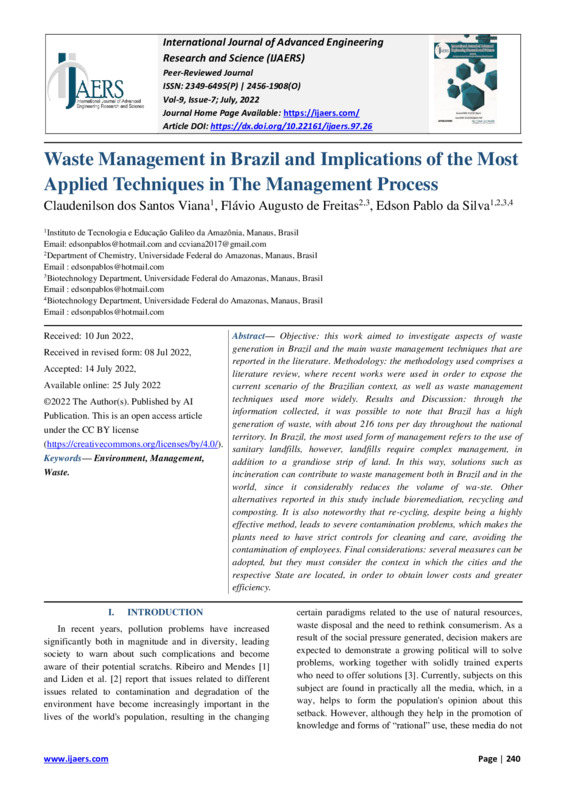-
Tipo do ITEM
-
Artigo Ciêntifico
-
Título do Artigo
-
WASTE MANAGEMENT IN BRAZIL AND IMPLICATIONS OF THE MOST APPLIED TECHNIQUES IN THE MANAGEMENT PROCESS
-
Descrição
-
This work aimed to investigate aspects of waste generation in Brazil and the main waste management techniques that are reported in the literature. Methodology: the methodology used comprises a literature review, where recent works were used in order to expose the current scenario of the Brazilian context, as well as waste management techniques used more widely. Results and Discussion: through the information collected, it was possible to note that Brazil has a high generation of waste, with about 216 tons per day throughout the national territory. In Brazil, the most used form of management refers to the use of sanitary landfills, however, landfills require complex management, in addition to a grandiose strip of land. In this way, solutions such as incineration can contribute to waste management both in Brazil and in the world, since it considerably reduces the volume of wa-ste. Other alternatives reported in this study include bioremediation, recycling and composting. It is also noteworthy that re-cycling, despite being a highly effective method, leads to severe contamination problems, which makes the plants need to have strict controls for cleaning and care, avoiding the contamination of employees. Final considerations: several measures can be adopted, but they must consider the context in which the cities and the respective State are located, in order to obtain lower costs and greater
efficiency.
-
Abstract
-
This work aimed to investigate aspects of waste generation in Brazil and the main waste management techniques that are reported in the literature. Methodology: the methodology used comprises a literature review, where recent works were used in order to expose the current scenario of the Brazilian context, as well as waste management techniques used more widely. Results and Discussion: through the information collected, it was possible to note that Brazil has a high generation of waste, with about 216 tons per day throughout the national territory. In Brazil, the most used form of management refers to the use of sanitary landfills, however, landfills require complex management, in addition to a grandiose strip of land. In this way, solutions such as incineration can contribute to waste management both in Brazil and in the world, since it considerably reduces the volume of wa-ste. Other alternatives reported in this study include bioremediation, recycling and composting. It is also noteworthy that re-cycling, despite being a highly effective method, leads to severe contamination problems, which makes the plants need to have strict controls for cleaning and care, avoiding the contamination of employees. Final considerations: several measures can be adopted, but they must consider the context in which the cities and the respective State are located, in order to obtain lower costs and greater
efficiency.
-
Língua do arquivo
-
inglês
-
Data da Publicação
-
Ano 2021
-
Palavra-chave
-
Environment
-
Management
-
Waste
-
Autores
-
Claudenilson dos Santos Viana
-
Flávio Augusto de Freitas
-
Edson Pablo da Silva
-
Local
-
ITEGAM - Manaus, 2022
-
Áreas de Conhecimento
-
Energia e Meio Ambiente
-
Turma
-
Turma 01


